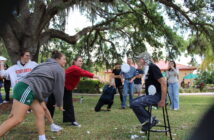
On Feb. 3, the up-and-coming poet Aja Monet visited the University for the Literature for Lunch presentation. She shared some of her work and talked with students who enjoy literature as well as aspire to become poets themselves.
Monet is a graduate of the Liberal Arts from Sarah Lawrence College and later earned her MFA in Creative Writing form the Art Institute of Chicago. She became the youngest poet to ever win the “Nuyorican Poets Cafe Grand Slam Champion” award at the age of 19 in 2007, and was the last woman to win the award ever since. Monet has established an international reputation for her performance in Paris as well as her interview with TVBrussel in 2013. Monet’s work often reflects her passions as a professed human rights activist, educator, songwriter, and singer, as well as her personal experiences in life.
Monet’s work often conveys strong passions and complex messages, such as her poems about human rights and love, where she often uses her observations and real life experiences to tell a story. Such a story is one she told the crowd at Saint Leo, where she recalls a time where her little brother was being harassed by a white police officer. It is these stories that she tells through her poetry that has earned her fame and a growing reputation.
Monet stated at the event that, “The white, euro-centric, patriarchal poetry that we hear… has the ability [for us]to not think about other people. They can write and talk about flowers and roses and geese and… all these other ethereal things of nature. And sometimes when you’re in the real midst of growing up in a social community… where people are really close together, poor, trying to understand and make sense of life, that your writing and inspiration comes out of the need to process, the need to get through, the need to liberate, the need to work through the things that are holding you hostage in your own mind and your own emotional reality, and I feel like that’s part of where my work came out of.”
Monet also states, “A lot of the work that I’m sharing with you is really old and it’s not where I am now.”
This suggests her work that she has chosen not to share has elements currently unknown to the public and might add more to her character and perhaps help propel her further into literary fame.




